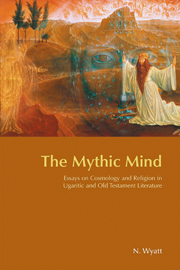Book contents
- Frontmatter
- Contents
- Preface
- Acknowledgments
- Abbreviations
- Chapter 1 THE PROBLEM OF THE ‘GOD OF THE FATHERS’
- Chapter 2 THE DEVELOPMENT OF THE TRADITION IN EXODUS 3
- Chapter 3 THE SIGNIFICANCE OF THE BURNING BUSH
- Chapter 4 WHO KILLED THE DRAGON?
- Chapter 5 SEA AND DESERT: SYMBOLIC GEOGRAPHY IN WEST SEMITIC RELIGIOUS THOUGHT
- Chapter 6 SYMBOLS OF EXILE
- Chapter 7 OF CALVES AND KINGS: THE CANAANITE DIMENSION IN THE RELIGION OF ISRAEL
- Chapter 8 THE DARKNESS OF GENESIS 1.2
- Chapter 9 THE SIGNIFICANCE OF SPN IN WEST SEMITIC THOUGHT: A CONTRIBUTION TO THE HISTORY OF A MYTHOLOGICAL MOTIF
- Chapter 10 THE VOCABULARY AND NEUROLOGY OF ORIENTATION: THE UGARITIC AND HEBREW EVIDENCE
- Chapter 11 THE MYTHIC MIND
- Chapter 12 ‘WATER, WATER EVERYWHERE…’: MUSINGS ON THE AQUEOUS MYTHS OF THE NEAR EAST
- Chapter 13 ANDROGYNY IN THE LEVANTINE WORLD
- Bibliography
- Index of References
- Index of Names and Places
Chapter 11 - THE MYTHIC MIND
- Frontmatter
- Contents
- Preface
- Acknowledgments
- Abbreviations
- Chapter 1 THE PROBLEM OF THE ‘GOD OF THE FATHERS’
- Chapter 2 THE DEVELOPMENT OF THE TRADITION IN EXODUS 3
- Chapter 3 THE SIGNIFICANCE OF THE BURNING BUSH
- Chapter 4 WHO KILLED THE DRAGON?
- Chapter 5 SEA AND DESERT: SYMBOLIC GEOGRAPHY IN WEST SEMITIC RELIGIOUS THOUGHT
- Chapter 6 SYMBOLS OF EXILE
- Chapter 7 OF CALVES AND KINGS: THE CANAANITE DIMENSION IN THE RELIGION OF ISRAEL
- Chapter 8 THE DARKNESS OF GENESIS 1.2
- Chapter 9 THE SIGNIFICANCE OF SPN IN WEST SEMITIC THOUGHT: A CONTRIBUTION TO THE HISTORY OF A MYTHOLOGICAL MOTIF
- Chapter 10 THE VOCABULARY AND NEUROLOGY OF ORIENTATION: THE UGARITIC AND HEBREW EVIDENCE
- Chapter 11 THE MYTHIC MIND
- Chapter 12 ‘WATER, WATER EVERYWHERE…’: MUSINGS ON THE AQUEOUS MYTHS OF THE NEAR EAST
- Chapter 13 ANDROGYNY IN THE LEVANTINE WORLD
- Bibliography
- Index of References
- Index of Names and Places
Summary
The Problem
The term ‘myth’ has endured a confused perception in recent years. On the one hand, there has been a long tradition of hostile intent towards it, typical for the most part, curiously, among biblical scholars and systematic theologians. Many have been at pains to distance themselves and the biblical literature from any association with it. I. Strenski, writing in a different context, even felt compelled to remark sardonically on its altogether false status:
…instead of there being a real thing, myth, there is a thriving industry, manufacturing and marketing what is called ‘myth’. ‘Myth’ is an ‘illusion’ – an appearance conjured or ‘construct’ created by artists and intellectuals toiling in the workshops of the myth industry…
He was here playing on the sheer elusive nature of the concept to deny it any real ontological or even conceptual validity. On the other hand, an increasing number of studies has brought about a process of rehabilitation, bringing a prodigal son back into the fold, and enriching the discipline with the insights he had gained while out in the cold, among alien peoples such as anthropologists and psychologists. While there is undoubtedly a positive reception in many quarters, even among some biblical scholars, of such a revisionist view of a category long held in deep hostility within this discipline, some elements of that hostility remain, and are still vocal.
- Type
- Chapter
- Information
- The Mythic MindEssays on Cosmology and Religion in Ugaritic and Old Testament Literature, pp. 151 - 188Publisher: Acumen PublishingPrint publication year: 2005



